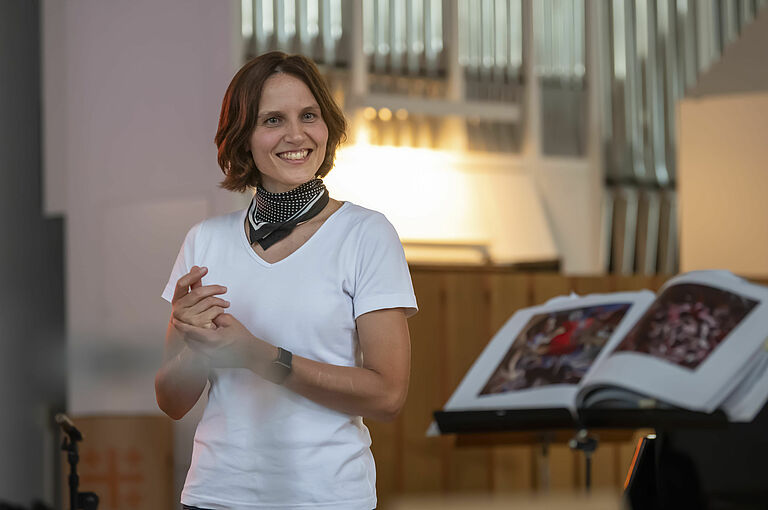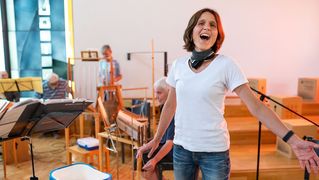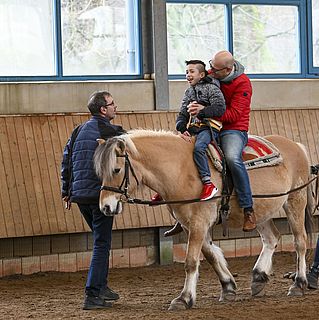
Close to people | Stories from Bethel
How a soprano copes without a short-term memory
Blimey, where did I put the key? And what was that famous actor's name again? Most of us are probably familiar with memory lapses like these. In rare cases, however, forgetfulness takes on more serious forms and becomes a serious impairment. This is the case with Miriam Ludewig. The client of the Eben-Ezer Foundation lives without a functioning short-term memory. A challenge that she masters with the support of other people, her mobile phone and a huge passion.
Living without a short-term memory: What is it like, how does it feel, how can you imagine it? You can't, unless you are affected yourself. Miriam Ludewig knows that. Nevertheless, she tries to visualise her limitation at the meeting in Lemgo. "The fact that I forget immediately means, for example, that I won't remember tonight that we've just met and are now talking to each other," she says. "My memory is just faulty."
Her abilities and her work are all the more remarkable: together with the cantor and music teacher Anna Ikramova, the soprano organises the musical contributions in the church services of the Eben-Ezer parish and takes part in concerts as a soloist. When she rehearses pieces, Miriam Ludewig does so without sheet music. The 37-year-old has never been able to memorise them due to her disability. Instead, she listens to and watches audio and video recordings. Even from her own rehearsals. She does this again and again, but: "Miriam only needs to hear a piece once or twice before she can reproduce it with her voice. When it comes to music, she has a fantastic memory," marvels Anna Ikramova. This also applies to the most difficult works, which require a great deal of memorisation. Anna Ikramova speaks of a unique talent.
It probably also has something to do with the magic of music that Miriam Ludewig does not forget melodies, rhythms and corresponding lyrics - unlike other information. "What I don't write down is gone immediately," she says. That's why she uses her mobile phone as a memory substitute. She records a lot of things on it: which pieces she has to practise for which rehearsal on which date. Which date and time she has to be where. "I can't do anything with information like 'Here again next week at the same time'," she explains.

"Music is my passion and my solace."
Miriam Ludewig says this calmly, clearly and with a firm voice. Perhaps she can talk about it so matter-of-factly because she has never known a life without impairment: her short-term memory did not work from birth due to a genetic defect. Despite this, Miriam Ludewig is coping well today. At Eben-Ezer, she receives the support she needs; she moves within fixed structures - and she has singing. "Music," says Miriam Ludewig, "means everything to me. It is my total passion and my solace. It's what I can draw energy from; it's what fulfils my life."
Text: Philipp Kreutzer | Photos: Christian Weische
Miriam Ludewig is currently involved in an unusual project. "AufBruch" is an integrative music theatre project by the Eben-Ezer Foundation and the Earquake ensemble from the Detmold University of Music (HfM). The participating choirs from Eben-Ezer and the Hausmusikkreis Linde are inclusive. The project is sponsored by the Aktion Mensch foundation. The premiere of "AufBruch" is on Friday, 4 November, at 5 pm in the Neu-Eben-Ezer church. Further performances will follow, also free of charge, on Saturday, 5 November at 7.30 pm in the Audience Hall of the Detmold University of Music and Performing Arts and on Sunday, 13 November at 5 pm in the Zionskirche in Bielefeld-Bethel.
This story simply told
Miriam Ludewig lives without a functioning short-term memory. This means she forgets almost everything. Only music is different. The 37-year-old loves singing and is very good at memorising new pieces. She sings in concerts and in church services at the Eben-Ezer parish in Lemgo. That gives her great pleasure.
Would you like to find out more?
Contact
Eben-Ezer Foundation
Volkeningweg 2-4
32657 Lemgo
Offers & services
The Eben-Ezer Foundation, based in Lemgo, is a diaconal organisation for people with mental disabilities and people with psychological impairments. In addition to care services, there are leisure activities, cultural events and Christian-spiritual experiences to encourage people with and without disabilities to live together.









